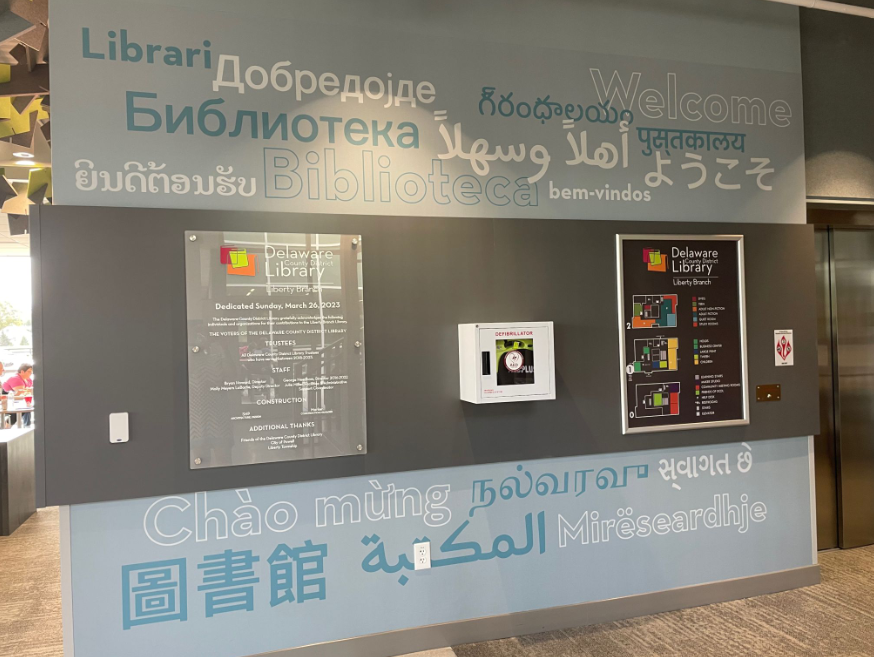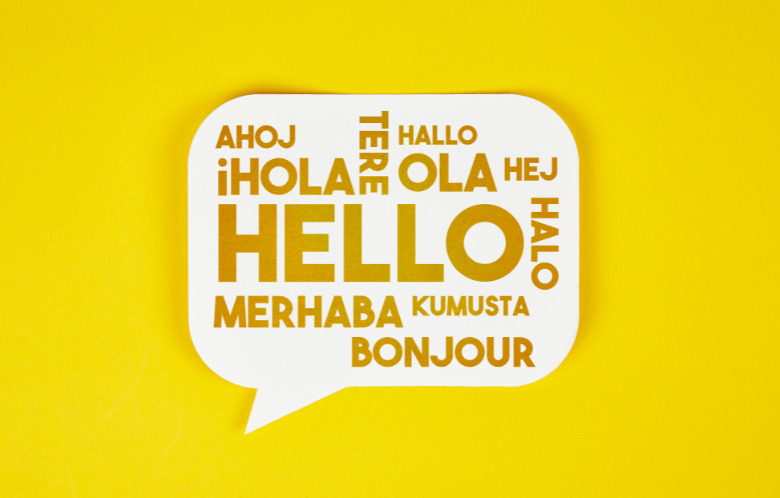Not too long ago, a man walked into the newly constructed Liberty Branch of the Delaware County District Library and began to sob. The man spotted the word “welcome” in his native language on a wall near the entrance. He told a library staffer that he hadn’t seen his native language in print since arriving in the United States.

The wall at the Delaware County District Library
Language has power. The language we use in our library and the promotions we create for our library demonstrate to our community members that they are valued and respected. If libraries are truly dedicated to providing and advocating for open access to information for all, then the language we use to communicate with our patrons and the wider world must match that pledge.
Inclusive language acknowledges diversity, conveys respect to all people, is sensitive to differences, and promotes equitable opportunities. Simply put, it lets our community members know that they are welcome in our libraries. Below are some very basic guidelines for any library considering a move toward more inclusive language for their promotions.
Pronouns
Here are some simple ways that libraries have exchanged common gendered pronouns for more inclusive language:
- “They” or “Them” instead of “He” or “She.”
- “Actor” instead of “Actress.”
- “First-year student” instead of “Freshman.”
- “Chair” instead of “Chairman.”
- “Hey, everyone!” instead of “Hey guys!”
- “Humanity” or “People” instead of “Mankind.”
Race and Ethnicity
When referring to a racial community’s general experience, many libraries use the most all-encompassing terms possible, such as the Black community, the Black Lives Matter movement, First Peoples, and Aboriginals.
When referring to all people of color generally, “persons of color” or “communities of color” are often used by libraries. American Indian and Native American are both acceptable terms for Indigenous people in the United States. However, if you are working on a program or project with a tribe, or you live outside the United States and are working with an Indigenous community, ask them how they prefer to be identified.
Hispanic is not an all-encompassing term, and the labels Hispanic and Latinx have different connotations. Some members of this community prefer the term Latine over Latinx. If you are working with a group, ask them which term they prefer. If you can’t speak with the group, naming a nation or region of origin, such as Costa Rican or Columbian, is preferred.
Abilities
If you are working with a group with expertise in abilities, ask which term they prefer. Some may prefer person-first language, which puts the person before the disability in a sentence (i.e., an author who is blind) to acknowledge they are more than their disability. Others may ask you to use identity-first language, which positions disability as an identity, highlighting the way it impacted the person’s life experience. For example, Jevon Okundaye in a post for the Massachusetts Advocates for Children website, says, “The Deaf, blind, and autistic communities most frequently see their disability as being fundamental parts of who they are.”
Translations
When you make your marketing materials available in more languages, you are marketing more inclusively. According to CSA Research, 40 percent of people won’t use a website that is not translated. That’s a big chunk of people who would miss out on learning about your library.
Assess your community to determine if you have segments of the population who would benefit from translations of your library marketing materials. Deputy Director of Communications for the San Francisco Public Library Jaime Wong got help with this assessment from her city government partners. When her library set a circulation record, they made sure their exciting email announcement included translations.
“We know that 43 percent of San Franciscans speak a language other than English at home,” Wong told me. “The three languages that are most in need are currently Spanish, Chinese, and Filipino. Based on that assessment, we know that we need to provide more translations, more interpreters, more programming that's in Spanish and Chinese to reach these populations, especially for vital things.”
You may be able to turn to partner organizations to help with this project. When I worked at a library, we asked our local Spanish-language newspaper to help us with translations of important material, like our Welcome to the Library brochure.
Angela Hursh is the Manager of Engagement and Marketing for NoveList. She just finished listening to The Invisible Hour by Alice Hoffman.



